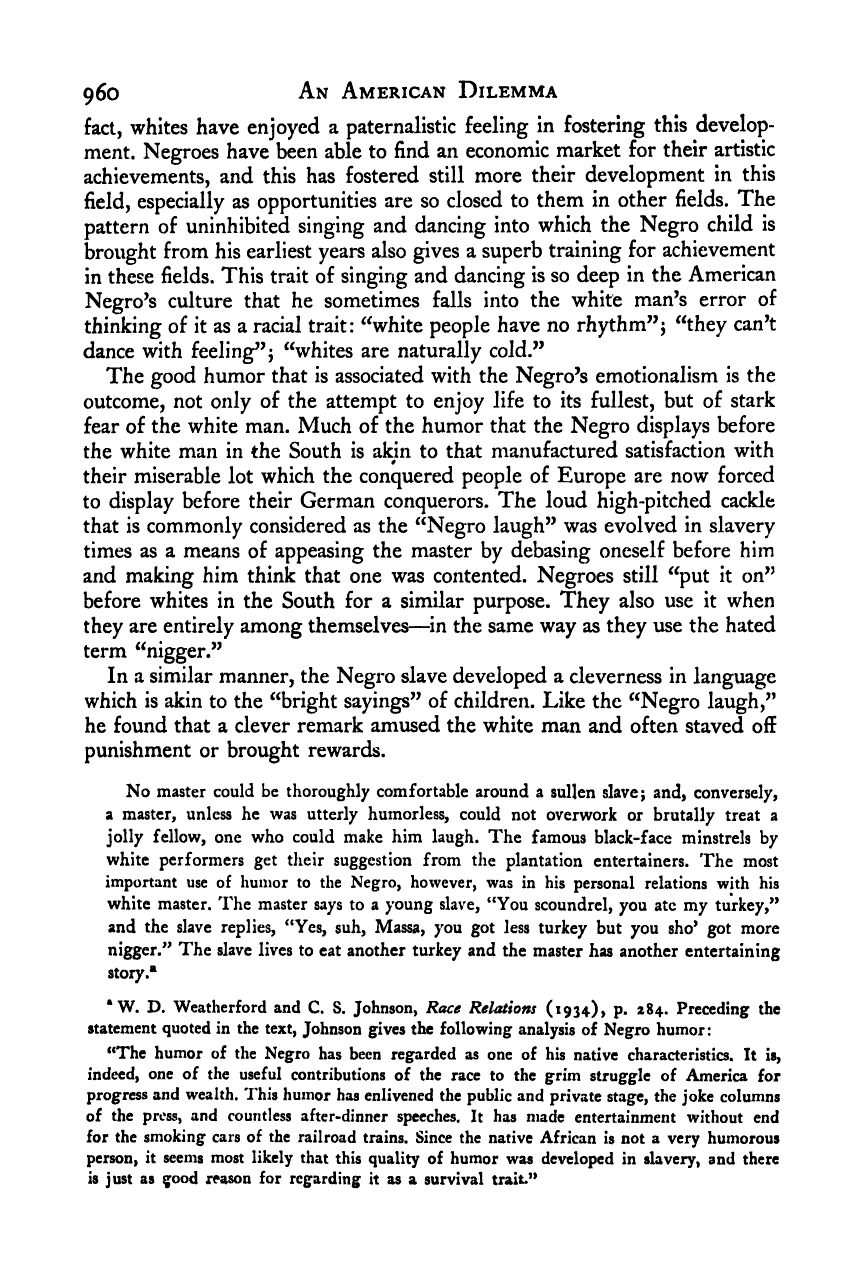Note: Gunnar Myrdal died in 1987, less than 70 years ago. Therefore, this work is protected by copyright, restricting your legal rights to reproduce it. However, you are welcome to view it on screen, as you do now. Read more about copyright.
Full resolution (TIFF) - On this page / på denna sida - X. The Negro Community - 44. Non-Institutional Aspects of the Negro Community - 1. “Peculiarities” of Negro Culture and Personality

<< prev. page << föreg. sida << >> nästa sida >> next page >>
Below is the raw OCR text
from the above scanned image.
Do you see an error? Proofread the page now!
Här nedan syns maskintolkade texten från faksimilbilden ovan.
Ser du något fel? Korrekturläs sidan nu!
This page has never been proofread. / Denna sida har aldrig korrekturlästs.
960 An American Dilemma
fact, whites have enjoyed a paternalistic feeling in fostering this develop-
ment. Negroes have been able to find an economic market for their artistic
achievements, and this has fostered still more their development in this
field, especially as opportunities are so closed to them in other fields. The
pattern of uninhibited singing and dancing into which the Negro child is
brought from his earliest years also gives a superb training for achievement
in these fields. This trait of singing and dancing is so deep in the American
Negroes culture that he sometimes falls into the white man^s error of
thinking of it as a racial trait: ^^white people have no rhythm” 5
^^they can’t
dance with feeling” j
^Svhites are naturally cold.”
The good humor that is associated with the Negro’s emotionalism is the
outcome, not only of the attempt to enjoy life to its fullest, but of stark
fear of the white man. Much of the humor that the Negro displays before
the white man in the South is akin to that manufactured satisfaction with
their miserable lot which the conquered people of Europe are now forced
to display before their German conquerors. The loud high-pitched cackle
that is commonly considered as the ^‘Negro laugh” was evolved in slavery
times as a means of appeasing the master by debasing oneself before him
and making him think that one was contented. Negroes still ^^put it on”
before whites in the South for a similar purpose. They also use it when
they are entirely among themselves—^in the same way as they use the hated
term ^‘nigger.”
In a similar manner, the Negro slave developed a cleverness in language
which is akin to the ^^bright sayings” of children. Like the ^^Negro laugh,”
he found that a clever remark amused the white man and often staved off
punishment or brought rewards.
No master could be thoroughly comfortable around a sullen slave; and, conversely,
a master, unless he was utterly humorless, could not overwork or brutally treat a
jolly fellow, one who could make him laugh. The famous black-face minstrels by
white performers get their suggestion from the plantation entertainers. The most
important use of humor to the Negro, however, was in his personal relations with his
white master. The master says to a young slave, “You scoundrel, you ate my turkey,”
and the slave replies, “Yes, suh, Massa, you got less turkey but you sho* got more
nigger.” The slave lives to eat another turkey and the master has another entertaining
story.®
* W. D. Weatherford and C. S. Johnson, Race Relations (1934), p. 284. Preceding the
statement quoted in the text, Johnson gives the following analysis of Negro humor:
“The humor of the Negro has been regarded as one of his native characteristics. It is,
indeed, one of the useful contributions of the race to the grim struggle of America for
progress and wealth. This humor has enlivened the public and private stage, the joke columns
of the press, and countless after-dinner speeches. It has made entertainment without end
for the smoking cars of the railroad trains. Since the native African is not a very humorous
person, it seems most likely that this quality of humor was developed in slavery, and there
is just as good reason for regarding it as a survival trait.”
<< prev. page << föreg. sida << >> nästa sida >> next page >>